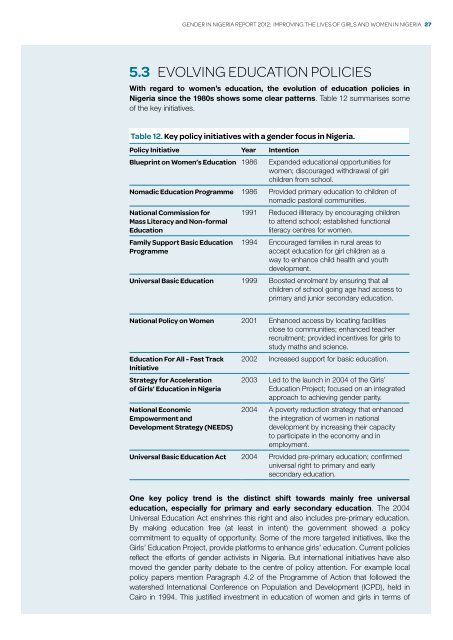Gender in niGeria report 2012 - Economic Commission for Africa
Gender in niGeria report 2012 - Economic Commission for Africa
Gender in niGeria report 2012 - Economic Commission for Africa
You also want an ePaper? Increase the reach of your titles
YUMPU automatically turns print PDFs into web optimized ePapers that Google loves.
<strong>Gender</strong> <strong>in</strong> Nigeria Report <strong>2012</strong>: Improv<strong>in</strong>g the Lives of Girls and Women <strong>in</strong> Nigeria 27<br />
5.3 Evolv<strong>in</strong>g education policies<br />
With regard to women’s education, the evolution of education policies <strong>in</strong><br />
Nigeria s<strong>in</strong>ce the 1980s shows some clear patterns. Table 12 summarises some<br />
of the key <strong>in</strong>itiatives.<br />
Table 12. Key policy <strong>in</strong>itiatives with a gender focus <strong>in</strong> Nigeria.<br />
Policy Initiative Year Intention<br />
Bluepr<strong>in</strong>t on Women’s Education 1986 Expanded educational opportunities <strong>for</strong><br />
women; discouraged withdrawal of girl<br />
children from school.<br />
Nomadic Education Programme 1986 Provided primary education to children of<br />
nomadic pastoral communities.<br />
National <strong>Commission</strong> <strong>for</strong><br />
Mass Literacy and Non-<strong>for</strong>mal<br />
Education<br />
Family Support Basic Education<br />
Programme<br />
1991 Reduced illiteracy by encourag<strong>in</strong>g children<br />
to attend school; established functional<br />
literacy centres <strong>for</strong> women.<br />
1994 Encouraged families <strong>in</strong> rural areas to<br />
accept education <strong>for</strong> girl children as a<br />
way to enhance child health and youth<br />
development.<br />
Universal Basic Education 1999 Boosted enrolment by ensur<strong>in</strong>g that all<br />
children of school go<strong>in</strong>g age had access to<br />
primary and junior secondary education.<br />
National Policy on Women 2001 Enhanced access by locat<strong>in</strong>g facilities<br />
close to communities; enhanced teacher<br />
recruitment; provided <strong>in</strong>centives <strong>for</strong> girls to<br />
study maths and science.<br />
Education For All - Fast Track<br />
Initiative<br />
2002 Increased support <strong>for</strong> basic education.<br />
Strategy <strong>for</strong> Acceleration<br />
of Girls’ Education <strong>in</strong> Nigeria<br />
National <strong>Economic</strong><br />
Empowerment and<br />
Development Strategy (NEEDS)<br />
2003 Led to the launch <strong>in</strong> 2004 of the Girls’<br />
Education Project; focused on an <strong>in</strong>tegrated<br />
approach to achiev<strong>in</strong>g gender parity.<br />
2004 A poverty reduction strategy that enhanced<br />
the <strong>in</strong>tegration of women <strong>in</strong> national<br />
development by <strong>in</strong>creas<strong>in</strong>g their capacity<br />
to participate <strong>in</strong> the economy and <strong>in</strong><br />
employment.<br />
Universal Basic Education Act 2004 Provided pre-primary education; confirmed<br />
universal right to primary and early<br />
secondary education.<br />
One key policy trend is the dist<strong>in</strong>ct shift towards ma<strong>in</strong>ly free universal<br />
education, especially <strong>for</strong> primary and early secondary education. The 2004<br />
Universal Education Act enshr<strong>in</strong>es this right and also <strong>in</strong>cludes pre-primary education.<br />
By mak<strong>in</strong>g education free (at least <strong>in</strong> <strong>in</strong>tent) the government showed a policy<br />
commitment to equality of opportunity. Some of the more targeted <strong>in</strong>itiatives, like the<br />
Girls’ Education Project, provide plat<strong>for</strong>ms to enhance girls’ education. Current policies<br />
reflect the ef<strong>for</strong>ts of gender activists <strong>in</strong> Nigeria. But <strong>in</strong>ternational <strong>in</strong>itiatives have also<br />
moved the gender parity debate to the centre of policy attention. For example local<br />
policy papers mention Paragraph 4.2 of the Programme of Action that followed the<br />
watershed International Conference on Population and Development (ICPD), held <strong>in</strong><br />
Cairo <strong>in</strong> 1994. This justified <strong>in</strong>vestment <strong>in</strong> education of women and girls <strong>in</strong> terms of

















